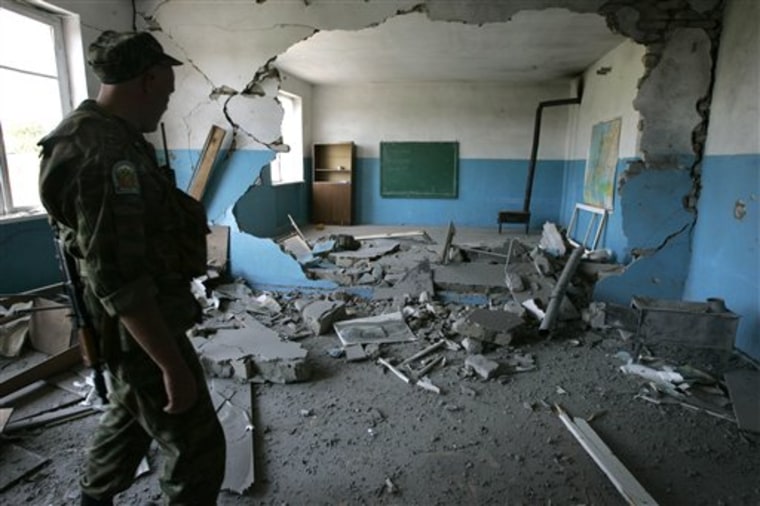Georgia said Friday it will recall all diplomatic staff from its embassy in Moscow to protest the presence of Russian troops on its territory. Russia criticized the move, saying it will not benefit relations between the countries.
Georgia's parliament had urged the government to sever diplomatic ties, calling Russia an "aggressor country." Georgian Foreign Ministry spokeswoman Nato Chikovani said Georgia will withdraw its staff on Saturday.
Russian news agencies have cited Russian Foreign Ministry spokesman Andrei Nesterenko as criticizing the move, saying it will not benefit bilateral relations.
Also Friday, an official from Georgia's breakaway province of South Ossetia said that Russia intends to eventually absorb the region. The development came three days after Moscow recognized South Ossetia as independent, drawing criticism from the West.
Russian President Dmitry Medvedev and the region's leader, Eduard Kokoity, discussed the future of South Ossetia earlier this week in Moscow, South Ossetian parliamentary speaker Znaur Gassiyev said.
Russia will absorb South Ossetia "in several years" or earlier, a position was "firmly stated by both leaders," Gassiyev said.
In Moscow, a Kremlin spokeswoman said Friday there was "no official information" on the talks.
A Georgian lawmaker said his country will eventually regain control of South Ossetia and another rebel region, Abkhazia.
The vice speaker of Georgia's parliament, Gigi Tsereteli, said the statement cannot be taken seriously.
"The separatist regimes of Abkhazia and South Ossetia and the Russian authorities are cut off from reality," Gigi Tsereteli said in Tbilisi. "The world has already become different and Russia will not long be able to occupy sovereign Georgian territory."
"The regimes of Abkhazia and South Ossetia should think about the fact that if they become part of Russia, they will be assimilated and in this way they will disappear," he added.
August's 'short war'
Moscow's recognition Tuesday of South Ossetia and another separatist province, Abkhazia, came on the back of a short war that began Aug. 7, when Georgia launched a military offensive to retake South Ossetia. Russia responded by rolling hundreds of tanks into the Moscow-friendly province and pushed the Georgian army out.
Russia blasted the offensive as blind aggression, saying the move deprived Georgian President Mikhail Saakashvili of the moral authority to defend Georgia's territorial integrity.
Georgia and the West in turn criticized Russia for pressing further into Georgia proper and for ignoring a cease-fire brokered by the European Union.
But a high-ranking official in French President Nicolas Sarkozy's office says that for now "we don't foresee any sanctions decided on by the European Council."
European Union leaders are holding a summit Monday and some member countries have pushed to punish Russia over the crisis with Georgia. But Sarkozy's office believes Europe must concentrate on pressuring Russia to apply a cease-fire agreement.
France currently holds the rotating EU presidency.
The official spoke Friday on condition of anonymity because of office policy. He elaborated on remarks by France's foreign minister, who has said sanctions were being considered.
'One united Russian state'
Meanwhile, Russia and South Ossetia plan to sign an agreement on the placement of Russian military bases in South Ossetia, the province's deputy parliamentary speaker Tarzan Kokoiti said. How many bases that involves will become clear on Sept. 2, when the document is set to be signed, he said.
He said South Ossetians have the right to reunite with North Ossetia, which is part of Russia.
"Soon there will be no North or South Ossetia — there will be a united Alania as part of Russia," Kokoiti said, using another name for Ossetia.
"We will live in one united Russian state," he said.
Russian Prime Minister Vladimir Putin accused the United States on Thursday of instigating the fighting in Georgia and said he suspects a connection to the U.S. presidential campaign — a contention the White House dismissed as "patently false."
Putin said that Russia had hoped the U.S. would restrain Georgia, which Moscow accuses of starting the war by attacking South Ossetia on Aug. 7. Instead, he suggested the U.S. encouraged the nation's leadership to try to rein in the separatist region by force.
Kurt Volker, the U.S. Ambassador to NATO, said Friday that the fighting was prompted by Russian pressure and shelling from South Ossetia.
"We did have lots of contacts with Georgia over a long period of time. And the nature of that has always been to say 'don't let yourself get drawn into a military confrontation here,'" Volker said in an interview with the British Broadcasting Corp. "Georgia found it too hard to hold that line when they were seeing what Russia was preparing to do."
